Only a few years ago, the name “Miranda July” served as a kind of password, a way to see if the person you’d just met had also been paying attention to the innovative, intimate performance work being done by women like Sadie Benning, Wynne Greenwood (Tracy & The Plastics), and Khaela Maricich (The Blow).
But with the publication of her story collection No One Belongs Here More Than You in 2007 and the 2011 release of The Future, her second feature film, Miranda July has transcended cult status. In the summer of 2011, The New York Times Magazine featured July on its cover, lauding her as perhaps “the most honest, uninhibited filmmaker of our time.”
 In April 2011, PDR was invited to participate in a round-table conversation with July about her new movie, screening at Independent Film Festival Boston. The other publications represented at the roundtable were: A Bostonian on Film, The Berkeley Beacon (Emerson University), Technology Review (MIT), and Boston University Daily Free Press. Rather than identify each participant by name, we use “Int” (Interviewer) for all.
In April 2011, PDR was invited to participate in a round-table conversation with July about her new movie, screening at Independent Film Festival Boston. The other publications represented at the roundtable were: A Bostonian on Film, The Berkeley Beacon (Emerson University), Technology Review (MIT), and Boston University Daily Free Press. Rather than identify each participant by name, we use “Int” (Interviewer) for all.
Interviewer: In the film, one of the things you said you were thinking about is the notion of wildness. Sophie and Jason are first considering adopting a cat and they are worried that it might be wild. And later, Sophie, distraught by her own actions, says, “I’m wild.”
I wonder if you can talk a little bit about your thinking about “wild” and “wildness” as you were working through making this film.
Miranda July: Yeah, they would seem to be different kinds of wildness, but in my head it’s the same. And it’s the wildness that comes from … it’s the part of yourself that doesn’t really believe that you could be loved and do the lifelong domestic relationship, and that you might feel that alone, like Paw Paw says in the middle of the night: “I am wild and always will be.”
And I could see her [Sophie] getting into that place, which would be, in a relationship, a pretty self-destructive kind of place – [it is] so outside of the framework of being involved, to really believe in the domestication – that it almost wouldn’t matter what you did.
Int: I was wondering how you view the connection between performance and the writing process and if, while you’re writing, you think actively about what kind of people might be performing [the work].
July: I don’t yet do that. I’m kind of acting out the whole thing as I’m going, which is fine for my roles, the parts I’m going to play, but it then means I have this very specific idea of exactly how I want it said by the time I get to the casting process, because I’ve already said it that way again and again. Which makes it hard; I get very narrow and specific, and so many great actors are brought to me, and it’s also very visual, you know, I feel like, why not be sort of dumb about it since it is a visual medium? And be like, “Well, these two people look like they would be together, and this guy seems like the last guy … ”
You know, to be almost sort of comic-book-like about it. And I remember saying that with the first movie too, that everyone had to be from the same comic book.
Int: When you think about your work, do you think about it in the most surreal way? Because most of your stories are about the little things in life; they are realistic, but at the same time you’re referring to these images of things that seem completely imaginary. How do they work together?
July: Those two realms are what is most interesting to me. In my life, I focus on – almost too much on – and find so much meaning in, the littlest thing, or am just kind of floored by the person next to me on the plane. Everything about them seems so interesting, you know, and that really easily turns into a story in my head.
And at the same time, I’m trying to get at things that are really hard to articulate or explain … trying to find metaphors or symbols or placeholders for that stuff to kind of bring them in, bring them into the world of things, which I obviously do a lot in this movie, try and bring hard-to-articulate feelings in.
The things that are either spiritual, or emotional things that are – just to say one, there’s the scene where I’m in the shirt – I guess that’s not really … okay, that’s real. I’m in the shirt.
[Laughter]
Int: But it behaves like some kind of uncanny, supernatural creature; the shirt actually comes slithering into the house.
July: That’s a better example. I think I wanted to show, and I’ve had that feeling, of betraying myself so much that I felt like I was haunting myself. And so to have her security blanket tee-shirt crawling after her felt like a more accurate way to show that feeling than to have me be just sort of despondent.
Int: Your fiction often portrays characters who have to struggle against an inertia, and that can even seem to cross over into a kind of paralysis. In this film, Sophie imagines a possible future in which she says,“We wouldn’t have to try, we wouldn’t have to do anything ever.”
I wonder, do you experience that tension in your own life, between artistic activity and inertia? Or do you feel that’s a common experience that a lot of people can relate to?
July: Well, I do feel that. I know it seems like I’m very productive, but it’s like an all-out battle in my mind. Like if I were to slow down at all, I think I would just never move again.
That battle feels very high-stakes, and every day I have to fight it. My best friend, who is very creative and the funniest person I know, will spend whole years essentially lying on her couch, and I relate to her so much and have so much respect for her. And she’ll say, “I’m just as creative as you; this kills me that I cannot get up.” And so I think that some of her was in this.
But you are right; it really is in a lot of other work, and that’s me.
[Laughter]
Int: When you first get an idea for a story or an image, like the shirt moving across the floor, how do you know personally if it’s right for a film or a short story?
July: You mean which medium? Well, usually I just know because I’m trying to come up with ideas for a particular work, and so everything I’m thinking of is in that category. I will say, though, this movie, it began first as a short story, which wasn’t a good short story.
Then a lot of the ideas, including the shirt, came about in a performance that I did, which was pretty good. I was like:
 “Oh, I think this could be a movie, it might be more interesting in a way as a movie, I think specifically because those weirder ideas like the shirt are not actually that weird in a performance context, where anything goes.” So that was an interesting challenge, to make it really work as a character, and even just technically to make it look right. I mean, in the performance, it was on pulleys and stuff, so clunky. But I also knew it worked in a way because if it worked that way, done live, then I thought it would be better in the movie.
“Oh, I think this could be a movie, it might be more interesting in a way as a movie, I think specifically because those weirder ideas like the shirt are not actually that weird in a performance context, where anything goes.” So that was an interesting challenge, to make it really work as a character, and even just technically to make it look right. I mean, in the performance, it was on pulleys and stuff, so clunky. But I also knew it worked in a way because if it worked that way, done live, then I thought it would be better in the movie.
Int: How is this whole process of promoting a movie and taking it out, how is that for you, talking about your ideas and your life?
July: Well, it’s funny, my husband [film director Mike Mills] is also doing the same thing right now, so we talk about this, which is good, because it’s an annoying thing to talk about my problems and going to hotels…
[Laughter]
But he was reminding me that when we’re making the movie, this is all we dream of, you know? Sitting at a round table in a hotel just seems like heaven on earth, you know: that you could get to that point where other people had seen it and were willing to talk to you about it, and to some degree believing in it as a real movie.
So that does still seem like a minor miracle. Although, of course, wherever you are you want to get somewhere else. So right now I’m like: “Oh, I’m going to write such good stuff when I’m done with this...” Of course, once all I have to do is write, I’ll want to be here – so it’s really terrible!
[Laughter]
Int: Do you have anything lined up now, or are you starting to think about something else?
July: Well, I want to write a novel just because I’m trying to figure out how to be a writer. I wrote a book of short stories, and it’s kind of the next logical thing one tries to do in that form.
And then I want to do another performance, make some art thing. I have basically all these notebooks of all ideas I had for other things while I was making this movie, so I have to do those things before I make the next movie because it just takes over your life.
I do want to make another movie, but I just think I’m not the kind of person that can do that quickly. It’ll probably be just as many years until the next one.
Int: You’re part of the independent film community, but could you ever imagine working for a big Hollywood film studio, even if that means accepting tough constraints?
July: Well, certainly, if anyone wants to give me lots of money to do my script, I would love that – a studio or otherwise, it’s not my choice really. If you’re going to not cast stars and do something that looks as risky as this does on paper, then it ends up being at this budget.
I mean, have things gotten better for independent movies? The last few years were not a great time for anyone to get financing for their movies. And I know a lot of people told me, when I was struggling to get money for this movie, and I’d be like: “Well, it wasn’t that hard to get funding for my first movie.” People would say: “You’d never be able to make that first movie now.”
That was kind of the end of an era as far as companies thinking “this will be the next big thing.” But at the same time there’s a lot more much smaller budget movies, ones that are like a couple hundred thousand dollars, and some of those break out. I’ve seen them at festivals, and there are just so many of those; so in that sense, yeah, there are just a lot more movies period.
Int: What filmmakers or artists who are working right now do you consider to be influences, or do you work or collaborate with?
July: As far as in my world, well, there is my husband, Mike Mills, obviously, who is the main filmmaker that I’m contextualizing myself with on a day-to-day level.
Spike Jonze – we trade scripts and give each other a lot of feedback, which is nice. I mean, I’m giving him feedback on a movie that costs a hundred times what mine costs, but actually it’s interesting to realize that it comes down to the same thing in the end. You are trying to tell a story, and you do it.
To be really honest, I wish I knew more women filmmakers. They are out there, and it’s amazing how … I think in some ways men and women reach out to each other more than women and women.
 And I think we’re all so reluctant to get put in the “woman filmmaker” reductive category that you almost just shy away. But I’m ready for that to change. I feel like whatever would be lost, I would gain a lot more from getting a little bit more of a community with some other women.
And I think we’re all so reluctant to get put in the “woman filmmaker” reductive category that you almost just shy away. But I’m ready for that to change. I feel like whatever would be lost, I would gain a lot more from getting a little bit more of a community with some other women.
Int: It reminds me a little bit of the Guerilla Girls, this notion that they weren’t revealing who they were but at the same time forming a kind of collective that challenged some of the male domination of the art world; but they kept their anonymity ...
July: So they wouldn’t be ghettoized, exactly. My fantasy is to have a listserv – if that still exists – but something among us [women filmmakers].
You could be like: “Is anyone else dealing with this?” or “Have you noticed that this company is really weird?” Just because you have no way of gauging it, so you’re like: “Maybe its just me and I suck, or is this actually a sexism issue, you know?” It’s hard to get a larger sense of what’s going on.
Int: I once spoke to Courtney Hunt, who made Frozen River, and she had said – well she didn’t say who, no details – but that she experienced sexism, that being a female held her back in the industry. Have you had any experiences like that?
July: Well, it’s hard. It’s so insidious that I can’t say, “No, that there haven’t been specific incidents where I’ve been horrified at someone’s actions.”
I also think I’m really avoiding people. Like if I smell that at all, I’m just out of there. Gone. But there are weird challenges. Like you’re a woman, but you’re making a movie that you’re in, and that you are likely to be the focal point of, so you are essentially trying to find a co-star who’s gonna be in the girlfriend role. And I began to realize that at a certain point in casting, that if I was me, but a guy, there would be so many women who would love to play the girlfriend, because there are such shitty parts out there anyways.
Int: I remember this banner you had on your website: of course you know exactly what I’m talking about. And in this film, the characters are speaking a kind of private language where they each know exactly what the other is talking about.
Do you have that same kind of goal in the films that you make, of connecting with the viewer, like even though these things that are happening seem very bizarre or particular, they actually have a kind of universality?
July: Yeah, I mean I feel like when it’s good – when I feel like it’s working, I don’t worry about weirdness or those things. Someone else might be worried about it, but I feel like “no, its working.”
I think that even if people are logically a little unsure, on some other level they are going to be nodding. Which is just, that’s my job I guess, to go out on a limb while simultaeously being familiar and inviting. That’s the line to walk.
Int: In a bunch of your stories, people avoid helping others. Like in “The Shared Patio,” the guy is having a seizure, and [the protagonist] walks away and [doesn’t] help. And in “Majesty,” the character doesn’t chase Potato. I was wondering how these are connected thematically.
July: In all of those, the person isn’t quite present enough to realize that their actions really have consequences. That would almost be a complement to them to think, “Oh, I could be the one to save the day here … what I do matters.” And they might realize that in the course of it … a lot of times the characters don’t realize that, and only the reader does. And I guess it goes back to that paralysis thing, but with some awareness that that’s a mistake or you are paying the price for that.
Int: A few of us are still in college, and I’d like to ask, when you decided to drop out, was that spontaneous, did you plan that?
July: It wasn’t. It’s sort of like when you quit a job. You just suddenly realize, “Oh, I could just leave.” It seems like the craziest thing anyone has ever thought, but you realize, “Oh, I wouldn’t have to do any of this.” I think some people become an adult through college, but to me it took leaving it to really realize that I had autonomy. And I still love that feeling. How do you do that now? I don’t know.

Miranda July is a filmmaker, artist, and writer. Her videos, performances, and web-based projects have been presented at sites such as the Museum of Modern Art, the Guggenheim Museum and in two Whitney Biennials. July wrote, directed and starred in her first feature-length film, Me and You and Everyone We Know (2005), which was awarded numerous prizes, including the Camera d’Or. July’s most recent film is The Future (2011), which she wrote and directed and stars in.
July’s fiction has appeared in The Paris Review, Harper’s, and The New Yorker; her collection of stories, No One Belongs Here More Than You (Scribner, 2007), won the Frank O’Connor International Short Story Award and has been published in twenty countries. Her latest book is It Chooses You (McSweeney’s, 2011).
